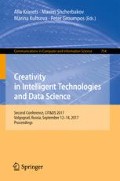Abstract
The paper presents a novel supervised learning method for fuzzy cognitive maps adapted from the theory of artificial neural networks. The main objective in designing the method was to pay closer attention to the distinctions that exist between fuzzy cognitive maps, and the original model for which the method was intended – whether it was a feedforward neural network, a recurrent network, or an energy-based model. The augmented version strives to properly build upon the various strengths of fuzzy cognitive maps – particularly on their interpretability, which arises from the close coupling that exists between their nodes and particular concepts. It is shown that the augmented method is able to outperform existing approaches. Notably, the ability of the learned model to generalize correctly, and to faithfully reconstruct the original system is studied.
Access this chapter
Tax calculation will be finalised at checkout
Purchases are for personal use only
References
Kim, M.C., Kim, C.O., Hong, S.R., Kwon, I.H.: Forward-backward analysis of RFID-enabled supply chain using fuzzy cognitive map and genetic algorithm. Expert Syst. Appl. 35(3), 1166–1176 (2008)
Trappey, A.J., Trappey, C.V., Wu, C.R.: Genetic algorithm dynamic performance evaluation for RFID reverse logistic management. Expert Syst. Appl. 37(11), 7329–7335 (2010)
Vaščák, J., Hvizdoš, J.: Vehicle navigation by fuzzy cognitive maps using sonar and RFID technologies. In: 2016 IEEE 14th International Symposium on Applied Machine Intelligence and Informatics (SAMI), pp. 75–80. IEEE (2016)
Groumpos, P.P.: Fuzzy cognitive maps: basic theories and their application to complex systems. In: Glykas, M. (ed.) Fuzzy Cognitive Maps, pp. 1–22. Springer, Berlin (2010)
Dickerson, J.A., Kosko, B.: Virtual worlds as fuzzy cognitive maps. In: Virtual Reality Annual International Symposium, pp. 471–477. IEEE (1993)
Stach, W., Kurgan, L., Pedrycz, W.: A survey of fuzzy cognitive map learning methods. Issues Soft Comput. Theory Appl. 71–84 (2005)
Stach, W., Kurgan, L., Pedrycz, W., Reformat, M.: Genetic learning of fuzzy cognitive maps. Fuzzy Sets Syst. 153(3), 371–401 (2005)
Mls, K., Cimler, R., Vaščák, J., Puheim, M.: Interactive evolutionary optimization of fuzzy cognitive maps. Neurocomputing 232, 58–68 (2017)
Papageorgiou, E.I., Parsopoulos, K.E., Stylios, C.S., Groumpos, P.P., Vrahatis, M.N.: Fuzzy cognitive maps learning using particle swarm optimization. J. Intell. Inf. Syst. 25(1), 95–121 (2005)
Huerga, A.V.: A balanced differential learning algorithm in fuzzy cognitive maps. In: Proceedings of the 16th International Workshop on Qualitative Reasoning, vol. 2002 (2002)
Papageorgiou, E., Stylios, C.D., Groumpos, P.P.: Active hebbian learning algorithm to train fuzzy cognitive maps. Int. J. Approximate Reasoning 37(3), 219–249 (2004)
Stach, W., Kurgan, L., Pedrycz, W.: Data-driven nonlinear hebbian learning method for fuzzy cognitive maps. In: IEEE International Conference on Fuzzy Systems. FUZZ-IEEE 2008 (IEEE World Congress on Computational Intelligence), pp. 1975–1981. IEEE (2008)
Papageorgiou, E.I., Groumpos, P.P.: A weight adaptation method for fuzzy cognitive map learning. Soft. Comput. 9(11), 846–857 (2005)
Gregor, M., Groumpos, P.P.: Tuning the position of a fuzzy cognitive map attractor using backpropagation through time. In: Proceedings of The 7th International Conference on Integrated Modeling and Analysis in Applied Control and Automation (IMAACA 2013), Athens (2013)
Gregor, M., Groumpos, P.P.: Training fuzzy cognitive maps using gradient-based supervised learning. In: Papadopoulos, H., Andreou, A.S., Iliadis, L., Maglogiannis, I. (eds.) AIAI 2013. IAICT, vol. 412, pp. 547–556. Springer, Heidelberg (2013). doi:10.1007/978-3-642-41142-7_55
Riedmiller, M., Braun, H.: A direct adaptive method for faster backpropagation learning: The rprop algorithm. In: 1993 IEEE International Conference on Neural Networks, IEEE. pp. 586–591 (1993)
Igel, C., Hüsken, M.: Improving the RPROP learning algorithm. In: Proceedings of the Second International ICSC Symposium on Neural Computation (NC 2000), Citeseer pp. 115–121 (2000)
Acknowledgements
This work has been supported by the Cultural and Educational Grant Agency of the Slovak Republic (KEGA) No. 038ŽU-4/2017: “Laboratory education methods of automatic identification and localization using radiofrequency identification technology”.
Author information
Authors and Affiliations
Corresponding author
Editor information
Editors and Affiliations
Rights and permissions
Copyright information
© 2017 Springer International Publishing AG
About this paper
Cite this paper
Gregor, M., Groumpos, P.P., Gregor, M. (2017). Using Weight Constraints and Masking to Improve Fuzzy Cognitive Map Models. In: Kravets, A., Shcherbakov, M., Kultsova, M., Groumpos, P. (eds) Creativity in Intelligent Technologies and Data Science. CIT&DS 2017. Communications in Computer and Information Science, vol 754. Springer, Cham. https://doi.org/10.1007/978-3-319-65551-2_7
Download citation
DOI: https://doi.org/10.1007/978-3-319-65551-2_7
Published:
Publisher Name: Springer, Cham
Print ISBN: 978-3-319-65550-5
Online ISBN: 978-3-319-65551-2
eBook Packages: Computer ScienceComputer Science (R0)

